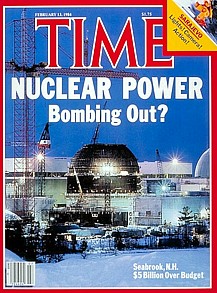Two former big-time politicos join the fight against CWIP.
Melissa Roberts wrote for CBS Atlanta yesterday, Unlikely duo challenges Ga. utility over rates,
The unlikely duo of ex-Democratic Gov. Roy Barnes and former Republican House Speaker Glenn Richardson are heading to court to challenge Georgia Power over a surcharge they say has cost ratepayers as much as $100 million.
They're going after Construction Work in Progress (CWIP)!
Jim Galloway in the AJC yesterday noted the irony,
The gentleman knows of what he speaks, and that is only one of the ironies here. The legislation that has allowed Georgia Power, for the last 15 months, to charge ratepayers for financial costs associated with the construction of two new nuclear power plants, was passed in 2009 during Richardson’s final session as the second- most powerful man in the Capitol.
Maybe he can help undo the harm he helped do. Ditto Roy Barnes, who got coal-plant-building Cobb EMC former head Dwight Brown off on a technicality.
Melissa Roberts wrote:
The lawsuit contends the utility is charging sales tax on the finance surcharge and the franchise tax paid to cities. Richardson said in a phone interview he and Barnes are two "Davids against the Goliath."
 Add those two Davids to the two Davids of Savannah, Drs. Sidney Smith and Pat Godbey and their Lower Rates for Customers LLC. Add a few more thousand Davids around the state paying their CWIP in separate checks with objections.
Add those two Davids to the two Davids of Savannah, Drs. Sidney Smith and Pat Godbey and their Lower Rates for Customers LLC. Add a few more thousand Davids around the state paying their CWIP in separate checks with objections.
New Hampshire banned CWIP and their nuke-building utility went bankrupt. Missouri banned CWIP. Iowa is working on banning CWIP. Georgia can ban CWIP, too. Watch out Goliath!
-jsq









